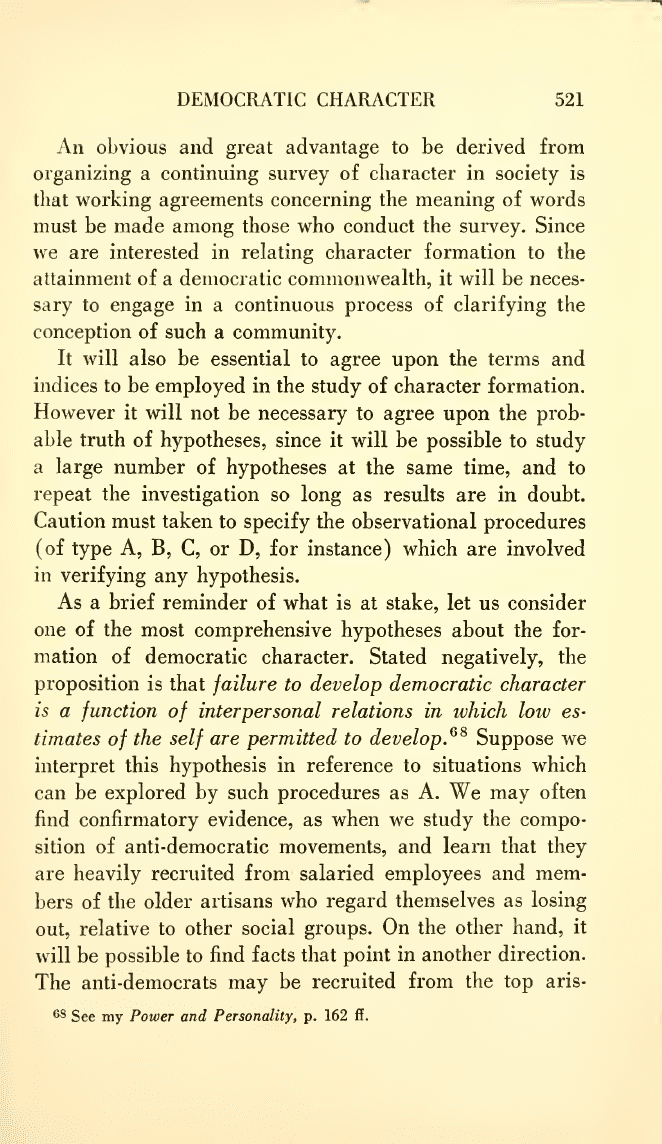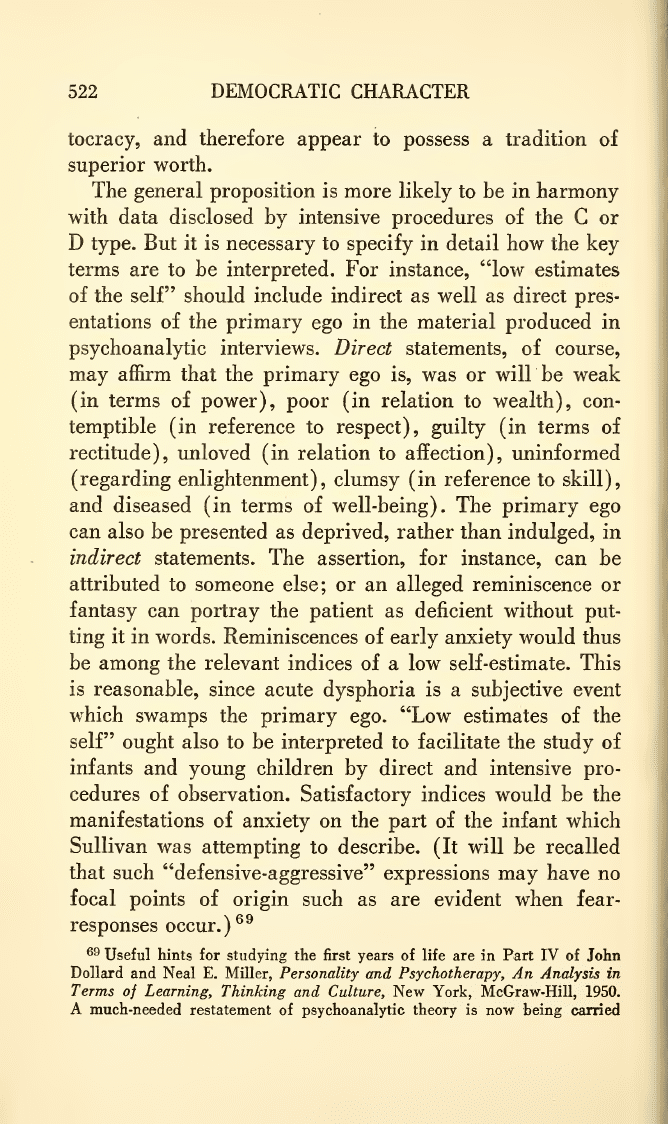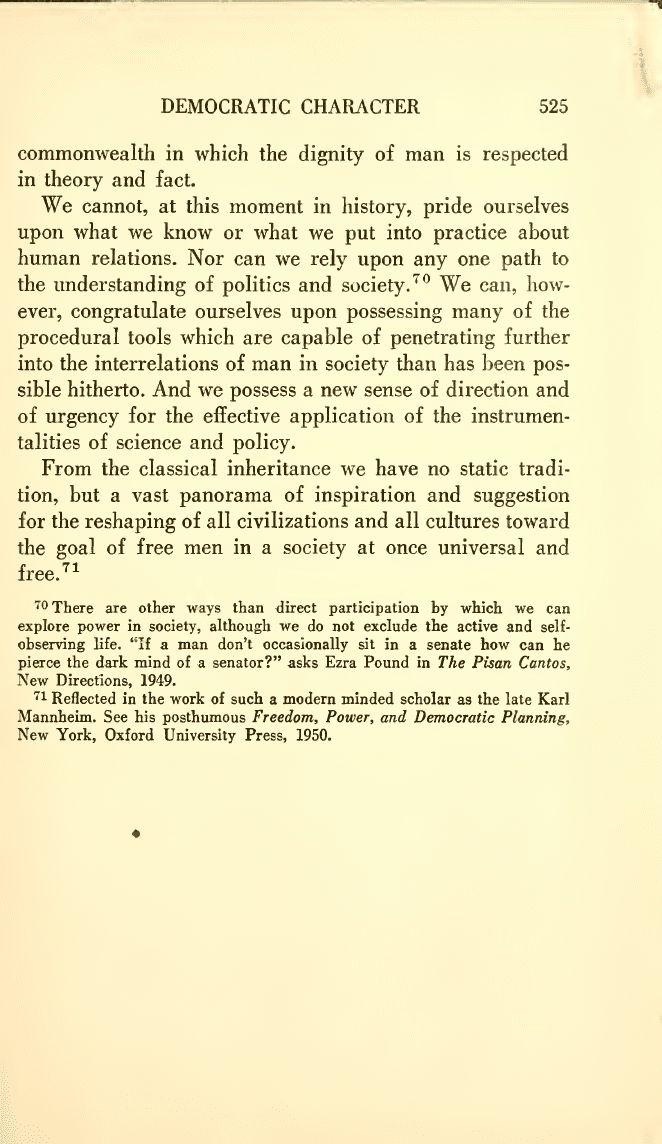Lasswell Harold D. The Political Writings of Harold D. Lasswell
Подождите немного. Документ загружается.


DEMOCRATIC CHARACTER 521
An obvious
and great
advantage to be derived from
organizing
a
continuing survey of character
in
society is
that working
agreements concerning the meaning
of
words
must be made
among
those who
conduct the survey. Since
we
are
interested in relating character formation
to the
attainment of
a
democratic commonwealth,
it
will
be
neces-
sary to engage in
a
continuous process
of
clarifying
the
conception
of such a community.
It will also
be essential
to
agree
upon the
terms
and
indices to
be employed in the
study of
character formation.
However
it will
not be necessary to agree upon the prob-
able truth
of
hypotheses, since it will
be possible to study
a large
number of hypotheses
at the same time, and to
repeat the
investigation
so long as results are in
doubt.
Caution
must taken
to specify the observational procedures
(of
type
A,
B,
C,
or D, for
instance) which are involved
in
verifying
any hypothesis.
As
a brief reminder
of what is at stake, let
us
consider
one
of the
most comprehensive hypotheses
about the for-
mation
of democratic
character. Stated negatively, the
proposition
is that
failure to
develop democratic character
is
a
function
of
interpersonal relations in which
low es-
timates
of
the
self
are
permitted to develop.^^ Suppose we
interpret
this hypothesis in reference
to
situations
which
can be
explored by such procedures
as
A. We may
often
find confirmatory evidence, as when we study
the compo-
sition of
anti-democratic
movements,
and learn that
they
are
heavily
recruited from salaried employees and mem-
bers of
the
older
artisans
who regard
themselves as
losing
out,
relative
to other
social
groups. On
the other hand,
it
will be
possible to
find facts
that point in
another direction.
The
anti-democrats
may be
recruited
from
the top aris-
es
See
my Power and
Personality,
p.
162
ff.

522
DEMOCRATIC
CHARACTER
tocracy, and therefore
appear to possess
a
tradition
of
superior worth.
The
general proposition
is more likely
to be in harmony
with data disclosed
by
intensive
procedures of the
C or
D type. But
it
is necessary to specify
in detail how the key
terms are
to be
interpreted.
For instance, "low estimates
of the self"
should include indirect as well as direct pres-
entations of the primary
ego
in
the material produced in
psychoanalytic interviews. Direct
statements, of course,
may
affirm
that the primary ego
is, was or
will
be weak
(in
terms
of power),
poor
(in relation
to
wealth),
con-
temptible (in
reference to respect), guilty (in terms
of
rectitude),
unloved (in relation
to
affection), uninformed
(regarding enlightenment),
clumsy (in reference
to
skill),
and diseased
(in terms of well-being). The primary ego
can also
be presented as deprived, rather than indulged, in
indirect statements.
The assertion, for instance,
can be
attributed
to someone else; or an alleged reminiscence or
fantasy can portray
the patient
as
deficient without
put-
ting
it in words.
Reminiscences of early anxiety
would
thus
be among the relevant
indices of
a
low self-estimate. This
is
reasonable, since
acute dysphoria is a subjective event
which
swamps
the primary
ego.
"Low estimates
of
the
self"
ought
also to be
interpreted
to facilitate the study of
infants
and young
children by direct and intensive pro-
cedures
of observation. Satisfactory indices
would be the
manifestations
of anxiety on the part
of the
infant which
Sullivan
was
attempting
to
describe. (It will
be
recalled
that
such "defensive-aggressive"
expressions may have no
focal
points of origin
such as are evident when fear-
responses
occur.)
^®
69
Useful hints for studying the
first years of life are in Part IV
of John
DoUard
and Neal E. Miller, Personality and Psychotherapy,
An
Analysis in
Terms
of
Learning, Thinking
and Culture, New York, McGraw-HiU,
1950.
A much-needed
restatement
of psychoanalytic
theory is
now being carried

DEMOCRATIC CHARACTER
523
When
we study
the equilibrium of factors sustaining
or
undermining the equilibrium of democratic activity
in a
specific community, or on the part of a
person,
during
a
selected period, it may sometimes
appear that
democratic
conduct does
not
depend, to a
significant degree,
upon
democratic
character. It may seem, for example,
that the
giving of
immediate indulgence to democratic responses,
and the inflicting of immediate deprivation upon
anti-
democratic acts, will outweigh
the factors making against
democratic
conduct. The continuing survey of
character and
culture
is essential if we are to
comprehend the interplay
of
factors affecting democratic behavior, including the im-
portance of the practices called the "self" and "energy"
system. By utilizing proper procedures it will be possible
to give the classical terms such as "character" and "con-
stitution"
a
contemporary meaning, and to estimate the
impact of practices
upon
one another.
The following questions
are
among those whose rele-
vance will not diminish: To what extent is it possible to
achieve democratic conduct in adult life without forming
democratic character in early life? To what
extent
can
democratic character formed in early life persist against
anti-democratic
environments in
later life? In what meas-
ure
can
democratic
conduct in
later
life form
democratic
character
among
adults (and the pre-adults influenced by
them)?
Freedom
and the Sciences
of
Man
To some extent descriptive probing
into the processes of
political
life has been held back
by inapplicable analogies
forward by Drs. Kris, Hartmann
and Lowenstein. The choice of operational
indices
and of "testable" hypotheses should
be
much
facilitated thereby.
The
equating
of anxiety with
repressed fear is
a
point requiring further
clarification
in the Dollard-Miller treatment,
and in
much
psychoanalytic
literature.

524
DEMOCRATIC
CHARACTER
from
the natural
sciences. It is insufficiently
acknowledged
that the role
of scientific work in human relations is
free-
dom rather
than prediction.
By
freedom is meant the
bringing into
the focus of awareness
of
some feature of
the
personality which has hitherto
operated as a
deter-
mining
factor
upon the choices made
by
the
individual,
but
which has been operating
unconsciously.
Once elevated
to the full
focus of waking consciousness, the factor which
has been operating "automatically
and
compulsively"
is
no longer in this
privileged position. The individual is now
free to take the factor into
consideration in the making
of
future
choices.
This enlargement
of the
scope of
freedom
is
the most
direct
contribution
of the study of interpersonal relations
to democracy. If more individuals
can be made aware of
the distorting effect
of anxiety upon their
judgments of
personnel and
of
public
and private issues, the continuing
reconstruction of civilization toward
the more perfect real-
ization
of
democratic
values will
be
expedited. Hence
it is
the growth
of
insight,
not simply of the capacity
of the
observer
to
predict the future
operation of an automatic
compulsion, or of a non-personal factor, that
represents
the
major
contribution
of the scientific study of interper-
sonal relations to policy. It is
by
exposing
and perhaps
destroying the
interpersonal
relationships which
have held
true in the past that
scientific effort
produces the most
far-
reaching
results. Hence all propositions
about character
or
society which are made by
the
scientific specialist
must
always
read "subject to
insight." In
a
sense
the aim
of the
science
of
man is to
make such a science superfluous.
This
is
achieved
in
the degree
that
insight into
value
goals,
past
trends,
and
past
conditioning
factors increases
the
scope
of policy
choice
touching
upon the
future
realization
of
a

DEMOCRATIC CHARACTER
525
commonwealth
in
which
the
dignity of man is
respected
in theory
and fact.
We
cannot,
at this moment in history, pride ourselves
upon
what
we
know
or what
we put
into practice about
human relations.
Nor
can we
rely
upon any one
path to
the understanding
of politics
and society.
^'^
We
can, how-
ever, congratulate
ourselves upon possessing
many of the
procedural
tools
which
are
capable of penetrating further
into the interrelations of man in society than has been pos-
sible hitherto. And we possess a new sense of direction and
of urgency for the effective application of the instrumen-
talities of science and policy.
From the classical inheritance we have no static tradi-
tion, but
a vast
panorama of
inspiration
and suggestion
for the reshaping of all
civilizations and
all cultures
toward
the
goal of free men in a
society at
once universal
and
free.^i
''^o
There are other ways than direct participation
by which we
can
explore power in society, although we
do
not exclude
the active
and self-
observing life.
''If a man
don't occasionally sit
in
a senate how
can he
pierce the dark mind of
a
senator?"
asks
Ezra Pound
in The
Pisan Cantos,
New Directions,
1949.
"^^
Reflected in the work of such
a
modern minded
scholar
as the late Karl
Mannheim.
See
his
posthumous Freedom,
Power,
and
Democratic Planning,
New York,
Oxford
University
Press, 1950.


<'^^



m&^
Date
Due
eturned Due
Returned
NOV
2
3
'58
^V
-
- ^-
j|i^"B6n^l
'
it'^UOV
2
5'g;<y
tlCT
1 8
*^7
^7liffi
OEC
1
1
'59
W^
Pie
14
'39
.hll4
^^A
^
s^
Ft
r
--n
FE£
i^
C
1
flw^
\^^
^
vSi
ng
^^
s^di
Rflgga^^
f^ff"»«^
mA.mui'j
«ft
JUN
1
7
'60
I KFT JHW
7 '^?LJ)
jf
-
SEP
2
'6^
NllBfeC12'62:
MIi:?L4k£i2i
EfiVUi
HM
2
?
^3
SEPz6'B3ML'
mih'i
BJ^
tep
»
/
M
8-8:.
Ji..-t5M^.P
I4'C3
nil
^
-^
SiUA
rior
fli^^^''^^
l
i
i^n
y
^stic
SEP]
ittfl^
Vc^
